Related Research Articles
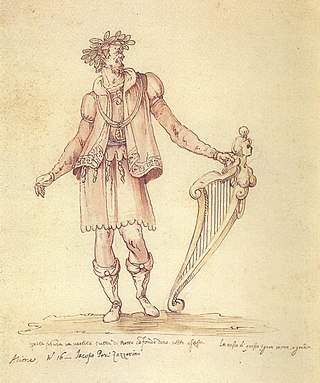
Jacopo Peri, known under the pseudonym Il Zazzerino, was an Italian composer and singer of the transitional period between the Renaissance and Baroque styles, and is often called the inventor of opera. He wrote the first work to be called an opera today, Dafne, and also the first opera to have survived to the present day, Euridice (1600).

Recitative is a style of delivery in which a singer is allowed to adopt the rhythms and delivery of ordinary speech. Recitative does not repeat lines as formally composed songs do. It resembles sung ordinary speech more than a formal musical composition.
Cristofano Malvezzi was an Italian organist and composer of the late Renaissance. He was one of the most famous composers in the city of Florence during a time of transition to the Baroque style.
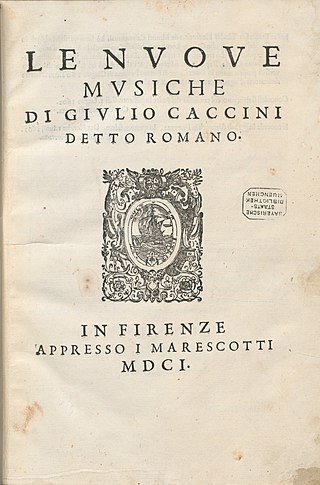
In music, monody refers to a solo vocal style distinguished by having a single melodic line and instrumental accompaniment. Although such music is found in various cultures throughout history, the term is specifically applied to Italian song of the early 17th century, particularly the period from about 1600 to 1640. The term is used both for the style and for individual songs. The term itself is a recent invention of scholars. No composer of the 17th century ever called a piece a monody. Compositions in monodic form might be called madrigals, motets, or even concertos.
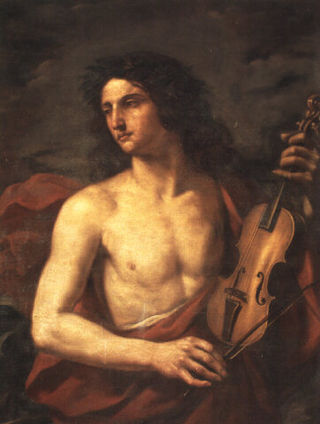
L'Orfeo, sometimes called La favola d'Orfeo[la ˈfaːvola dorˈfɛːo], is a late Renaissance/early Baroque favola in musica, or opera, by Claudio Monteverdi, with a libretto by Alessandro Striggio. It is based on the Greek legend of Orpheus, and tells the story of his descent to Hades and his fruitless attempt to bring his dead bride Eurydice back to the living world. It was written in 1607 for a court performance during the annual Carnival at Mantua. While Jacopo Peri's Dafne is generally recognised as the first work in the opera genre, and the earliest surviving opera is Peri's Euridice, L'Orfeo is the earliest that is still regularly performed.

Vincenzo Galilei was an Italian lutenist, composer, and music theorist. His children included the astronomer and physicist Galileo Galilei and the lute virtuoso and composer Michelagnolo Galilei. Vincenzo was a figure in the musical life of the late Renaissance and contributed significantly to the musical revolution which demarcates the beginning of the Baroque era.
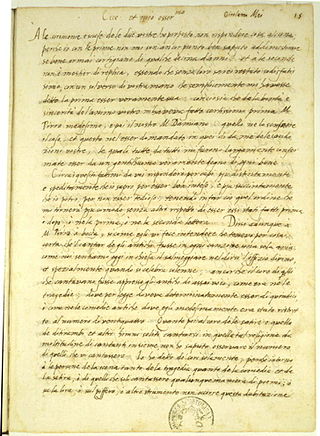
Girolamo Mei was an Italian historian and humanist, famous in music history for providing the intellectual impetus to the Florentine Camerata, which attempted to revive ancient Greek music drama. He was born in Florence, and died in Rome. He also used the pseudonym Decimo Corinella da Peretola.

Giovanni de' Bardi, Count of Vernio, was an Italian literary critic, writer, composer and soldier.

Emilio de' Cavalieri, or Emilio dei Cavalieri, the spellings "del" and "Cavaliere" are contemporary typographical errors, was an Italian composer, producer, organist, diplomat, choreographer and dancer at the end of the Renaissance era. His work, along with that of other composers active in Rome, Florence and Venice, was critical in defining the beginning of the musical Baroque era. A member of the Roman School of composers, he was an influential early composer of monody, and wrote what is usually considered to be the first oratorio.

Giulio Romolo Caccini was an Italian composer, teacher, singer, instrumentalist and writer of the late Renaissance and early Baroque eras. He was one of the founders of the genre of opera, and one of the most influential creators of the new Baroque style. He was also the father of the composer Francesca Caccini and the singer Settimia Caccini.
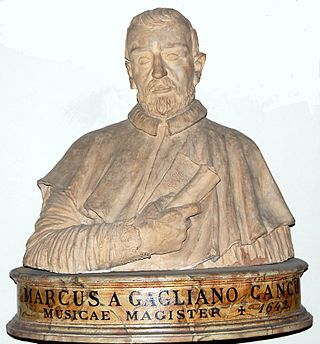
Marco da Gagliano was an Italian composer of the early Baroque era. He was important in the early history of opera and the development of the solo and concerted madrigal.
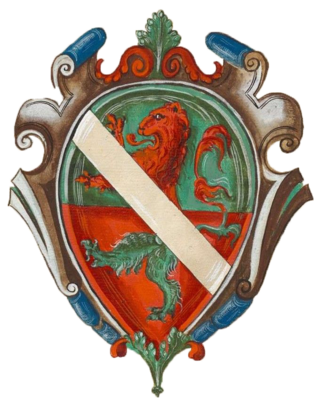
Jacopo Corsi was an Italian composer of the late Renaissance and early Baroque and one of Florence's leading patrons of the arts, after only the Medicis. His best-known work is Dafne (1597/98), whose score he wrote in collaboration with Jacopo Peri. Six fragments of the score have survived, two by Corsi and four by Peri. The libretto, by Ottavio Rinuccini, has survived intact. Despite priority quibbles at the time, Dafne is generally accepted as the first opera.

Ottavio Rinuccini was an Italian poet, courtier, and opera librettist at the end of the Renaissance and beginning of the Baroque eras. In collaborating with Jacopo Peri to produce the first opera, Dafne, in 1597, he became the first opera librettist.

Italian opera is both the art of opera in Italy and opera in the Italian language. Opera was born in Italy around the year 1600 and Italian opera has continued to play a dominant role in the history of the form until the present day. Many famous operas in Italian were written by foreign composers, including Handel, Gluck and Mozart. Works by native Italian composers of the 19th and early 20th centuries, such as Rossini, Bellini, Donizetti, Verdi and Puccini, are amongst the most famous operas ever written and today are performed in opera houses across the world.
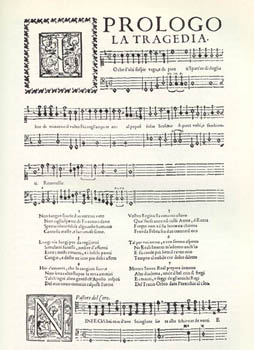
Euridice is an opera by Jacopo Peri, with additional music by Giulio Caccini. It is the earliest surviving opera, Peri's earlier Dafne being lost. The libretto by Ottavio Rinuccini is based on books X and XI of Ovid's Metamorphoses which recount the story of the legendary musician Orpheus and his wife Euridice.

The art form known as opera originated in Italy in the sixteenth and seventeenth centuries, though it drew upon older traditions of medieval and Renaissance courtly entertainment. The word opera, meaning "work" in Italian, was first used in the modern musical and theatrical sense in 1639 and soon spread to the other European languages. The earliest operas were modest productions compared to other Renaissance forms of sung drama, but they soon became more lavish and took on the spectacular stagings of the earlier genre known as intermedio.
In the years centering on 1600 in Europe, several distinct shifts emerged in ways of thinking about the purposes, writing and performance of music. Partly these changes were revolutionary, deliberately instigated by a group of intellectuals in Florence known as the Florentine Camerata, and partly they were evolutionary, in that precursors of the new Baroque style can be found far back in the Renaissance, and the changes merely built on extant forms and practices. The transitions emanated from the cultural centers of Northern Italy, then spread to Rome, France, Germany, and Spain, and lastly reached England . In terms of instrumental music, shifts in four discrete areas can be observed: idiomatic writing, texture, instrument use, and orchestration.

La Dafne (Daphne) is an early Italian opera, written in 1608 by the Italian composer Marco da Gagliano from a libretto by Ottavio Rinuccini. It is described as a favola in musica composed in one act and a prologue. The opera is based on the myth of Daphne and Apollo as related by Ovid in the first book of the Metamorphoses. An earlier version of the libretto had been set to music in 1597–98 by Jacopo Peri, whose Dafne is generally considered to be the first opera.
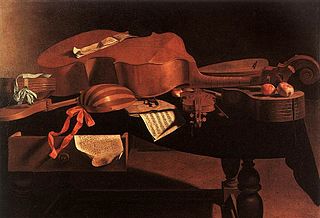
Baroque music refers to the period or dominant style of Western classical music composed from about 1600 to 1750. The Baroque style followed the Renaissance period, and was followed in turn by the Classical period after a short transition, the galant style. The Baroque period is divided into three major phases: early, middle, and late. Overlapping in time, they are conventionally dated from 1580 to 1650, from 1630 to 1700, and from 1680 to 1750. Baroque music forms a major portion of the "classical music" canon, and is widely studied, performed, and listened to. The term "baroque" comes from the Portuguese word barroco, meaning "misshapen pearl". The works of George Frideric Handel and Johann Sebastian Bach are considered the pinnacle of the Baroque period. Other key composers of the Baroque era include Claudio Monteverdi, Domenico Scarlatti, Alessandro Scarlatti, Alessandro Stradella, Antonio Vivaldi, Tomaso Albinoni, Johann Pachelbel, Henry Purcell, Georg Philipp Telemann, Jean-Baptiste Lully, Jean-Philippe Rameau, Marc-Antoine Charpentier, Arcangelo Corelli, François Couperin, Johann Hermann Schein, Heinrich Schütz, Samuel Scheidt, Dieterich Buxtehude, and others.
Barbara Russano Hanning is an American musicologist who specializes in 16th- and 17th-century Italian music. She has also written works on the music of 18th-century France and on musical iconography.
References
Citations
- 1 2 Grout (1947) , p. 43
- ↑ Palisca (1989) , p. 4
- ↑ Palisca (1989) , pp. 4–6
- ↑ Palisca (1989) , p. 7
- 1 2 Donington (1981) , p. 78
- 1 2 Palisca (1989) , p. 3
- ↑ Donington (1981) , p. 79
- ↑ Palisca (1989) , p. 5
- 1 2 3 4 Randel (1986) , "Camerata", vol. 3, p. 870
- 1 2 Grout (1947) , p. 46
- 1 2 3 Palisca (1989) , p. 8
- 1 2 Donington (1981) , p. 80
- ↑ Donington (1981) , p. 81
- ↑ Ewen (1971) , "Opera", p. 491
- ↑ Schrade (1950) , p. 39
- ↑ Donington (1981) , pp. 79–80
- 1 2 3 Grout (1947) , p. 44
- 1 2 3 4 5 6 Ewen (1971) , p. 491
- ↑ Donington (1981) , p. 85
- ↑ Schrade (1950) , p. 44
- ↑ Grout (1947) , p. 32
- ↑ Grout (1947) , p. 47
- 1 2 Donington (1981) , p. 82
- 1 2 Schrade (1950) , p. 45
- ↑ Palisca (1989) , p. 6
- ↑ Grout (1947) , p. 45
Sources
- Donington, Robert (1981). The Rise of Opera. New York, NY: Scribner. ISBN 9780684171654.
- Ewen, David (1971). The New Encyclopedia of the Opera . New York, NY: Hill and Wang. ISBN 9780809072620.
- Grout, Donald Jay (1947). A Short History of Opera: One-Volume Edition. New York, NY: Columbia University Press.
- Palisca, Claude V. (1989). The Florentine Camerata: Documentary Studies and Translations. Music Theory Translation Series. New Haven, CT: Yale University Press. ISBN 9780300039160.
- Randel, Don, ed. (1986). The New Harvard Dictionary of Music . Cambridge, MA: Harvard University Press. ISBN 9780674615250.
- Schrade, Leo (1950). Monteverdi: Creator of Modern Music . New York, NY: W. W. Norton & Co.